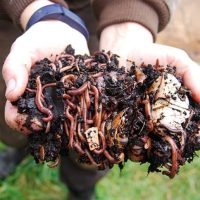The Weekly Dirt 06.26.24
06.26.24
Around The Farm
UW Farm and Teen Feed Reduce Food Waste & Support Food Security in University District
By Cassie Diamond
At first glance, feeding unhoused folks and protecting the environment may not seem like they have a whole lot to do with each other. However, Teen Feed volunteers have found a way to do both at the same time.
Read moreThe Weekly Dirt 06.12.24
06.12.24
Around The Farm
For The Love Of Pollinators: 5 Native Plants to Consider Planting to Help Support Local Pollinators
Article and Illustration by Ella Gostisha, Undergraduate Student, Environmental Studies Major, Program on the Environment ,UW Farm Beekeeping Intern, Spring ’24
Did you know that it takes more than 36 female worker bees to produce one single tablespoon of honey? Honey bees, which are not native to North America, are not only kept to produce honey for human consumption, but are responsible for pollinating more than 80% of all flowering plants, including more than 130 global crops that humans rely on.
Read moreThe Weekly Dirt 06.05.24
06.05.24
Around The Farm
Little Mice on the Prairie
Zereen Hazel Gesmundo, Undergraduate Student, Art 3D4M Major and Nutrition
Minor, UW Nutrition Education Intern Spring ‘24
Artist Statement: In my artwork, I utilize the realm of digital art to create painting-like drawings. My art education at UW has enabled me to expand my skills by using a variety of different mediums, including metal and ceramics.
Read moreThe Weekly Dirt 05.29.24
05.29.24
Around The Farm
UW Farm Community Supported Agriculture (CSA)
Program Launches Next Week!
By Aisling Doyle Wade, UW Farm Production Manager
An early season UW Farm CSA box from 2023
It’s hard to believe, but Wednesday June 5th, the 2024 UW Farm CSA will commence! Our Full Season (24 weeks) and Summer Season (16 weeks) CSA shareholders will be coming down to the farm to collect their very first CSA boxes of the 2024 season.
The Weekly Dirt 05.22.24
05.22.24
Around The Farm
Grounding During Cold Months
By Abigail Ipjian, Undergraduate Student, English & Creative Writing Major, UW Farm Education Intern Spring ’24
Step into your work boots, reader, it’s time
to get moving. Running on
a slice of buttered toast and
the rest of yesterday’s burnt cup of coffee, I want you to coax your body awake, and take in
the stagnant, but somehow fresh morning air.
The Weekly Dirt 05.15.24
05.15.24
Around The Farm
How the UW Farm Has Influenced My Journey With Food
By Alex Ball, Undergraduate Student, Food Systems, Nutrition, and Health, CSA Assistant Manager & Dani Elenga Intern
Food has always played an important role in my life. My mom is a registered dietician, and having her to help encourage healthful habits and eating behaviors made good food a priority from an early age.
UW Farm Weekly Dirt: Under the Surface: Adventures of a UW Farm Resident

A Day in the Life of a Red Wiggler
Hey there! I’m just your average worm living in the UW Farm’s bustling vermicompost bin. Let’s wriggle through a day in my underground life.
Rise and shine, it’s morning routine time. I move through our cozy bedding in search of breakfast. I can always find my buddies lined up at the buffet.
The Weekly Dirt 05.08.24
05.08.24
Around The Farm
Under the Surface: Adventures of a UW Farm Resident
By Taylor Bernard Clark, Undergraduate Student, Environmental Studies, College of the Environment, Vermicompost Intern
Today, we have a special guest joining us. This remarkable creature resides in the heart of our urban farm, working tirelessly to transform kitchen scraps into nutrient-rich compost. Prepare yourself to be amazed as we take a peek into a lifetime spent in (literal) shadow. As the UW Farm’s vermiculture intern, this guest is very near and dear to my heart.
The Weekly Dirt 05.01.24
05.01.24
Around The Farm
A Buzz at the Farm
By Brooke Baker, Undergraduate Student, Food Systems, Nutrition, and Health, School for Public Health, UW Farm Beekeeping Intern
The University of Washington has supported beekeeping activities for many years, using bees to incorporate hands-on experiences in classes and enrich student learning experiences. But it hasn’t necessarily been the smoothest ride for the bees, due to a staffing turnover and lack of enduring student leadership to advocate for their importance.
The Weekly Dirt 04.24.24
04.24.24
Around The Farm
The UW Farm provides a multitude of experiential learning experiences for 24 academic and program units across campus. Often students volunteer and earn credit or discover topics to write about, research, and document. In the Fall quarter of 2023, Lluvia Chavez, a UW Journalism student, sought out the farm for a class assignment and volunteered a number of times. She then shared her summative piece with us.
Read more